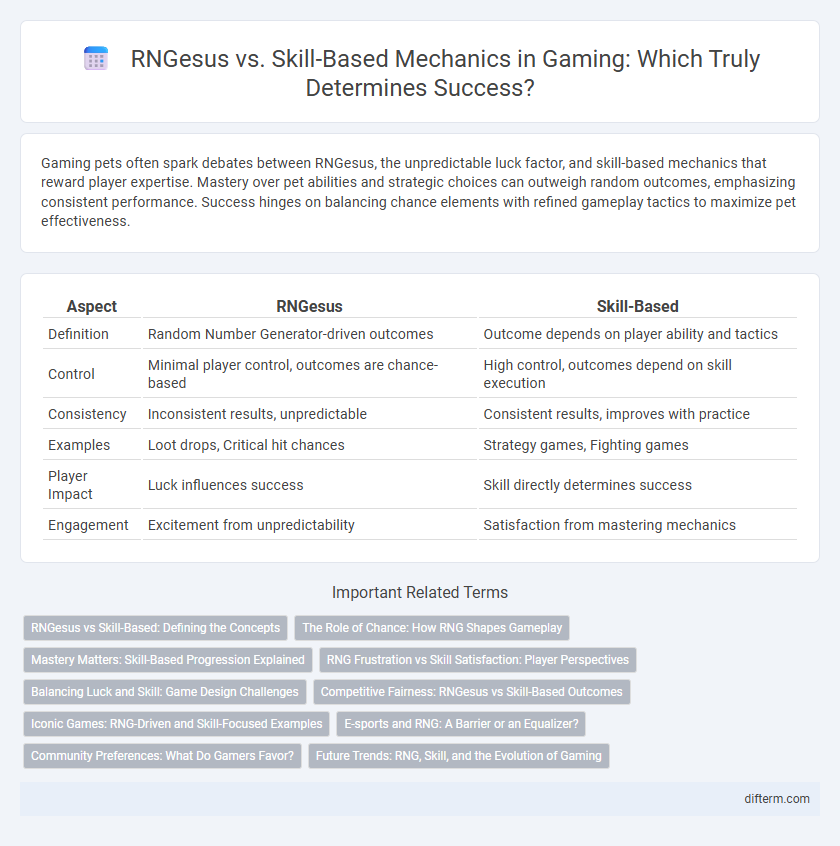Gaming pets often spark debates between RNGesus, the unpredictable luck factor, and skill-based mechanics that reward player expertise. Mastery over pet abilities and strategic choices can outweigh random outcomes, emphasizing consistent performance. Success hinges on balancing chance elements with refined gameplay tactics to maximize pet effectiveness.
Table of Comparison
| Aspect | RNGesus | Skill-Based |
|---|---|---|
| Definition | Random Number Generator-driven outcomes | Outcome depends on player ability and tactics |
| Control | Minimal player control, outcomes are chance-based | High control, outcomes depend on skill execution |
| Consistency | Inconsistent results, unpredictable | Consistent results, improves with practice |
| Examples | Loot drops, Critical hit chances | Strategy games, Fighting games |
| Player Impact | Luck influences success | Skill directly determines success |
| Engagement | Excitement from unpredictability | Satisfaction from mastering mechanics |
RNGesus vs Skill-Based: Defining the Concepts
RNGesus represents the role of randomness and luck in gaming outcomes, where chance events influence success unpredictably. Skill-based gaming emphasizes player expertise, strategy, and decision-making as primary factors determining victory. Understanding the balance between RNGesus and skill-based elements clarifies game design choices and player engagement dynamics.
The Role of Chance: How RNG Shapes Gameplay
Random Number Generation (RNG) significantly influences gameplay by introducing unpredictable outcomes that can both challenge and frustrate players, creating dynamic scenarios across various game genres. While skill remains a critical factor, RNG elements ensure that no two matches are identical, compelling players to adapt their strategies in real-time. This blend of chance and skill enhances replayability, fosters excitement, and balances competitive fairness by preventing absolute domination based solely on player expertise.
Mastery Matters: Skill-Based Progression Explained
Skill-based progression in gaming emphasizes player mastery by rewarding consistent performance and strategic decision-making over random chance. This system ensures that advancement depends on refining techniques, understanding game mechanics, and adapting to challenges, creating a fairer competitive environment. Players who invest time honing skills experience a satisfying sense of growth, contrasting with RNGesus-driven outcomes that rely heavily on luck.
RNG Frustration vs Skill Satisfaction: Player Perspectives
RNGesus often causes frustration among gamers due to unpredictable loot drops and random outcomes that can undermine player effort, leading to feelings of unfairness. In contrast, skill-based mechanics reward mastery and strategic thinking, fostering a sense of accomplishment and satisfaction as players see direct results of their abilities. Many players express preference for skill-driven gameplay as it provides consistent challenges and meaningful progression, reducing the randomness-induced anxiety common in RNG-dependent games.
Balancing Luck and Skill: Game Design Challenges
Balancing luck and skill in game design presents challenges where RNGesus elements introduce unpredictability, impacting player strategy and engagement. Developers must fine-tune random number generation to ensure fairness while maintaining excitement, preventing frustration from perceived unfair outcomes. Effective integration of RNG and skill-based mechanics promotes competitive integrity and player satisfaction in gaming environments.
Competitive Fairness: RNGesus vs Skill-Based Outcomes
Competitive fairness in gaming hinges on balancing RNGesus elements with skill-based outcomes to ensure equal opportunity for all players. While RNGesus introduces random variability that can level the playing field, excessive randomness may undermine player skill and strategic depth. Skill-based systems prioritize player expertise and decision-making, fostering a fairer environment where outcomes reflect mastery rather than chance.
Iconic Games: RNG-Driven and Skill-Focused Examples
Iconic RNG-driven games like Hearthstone and Clash Royale rely heavily on random number generation to augment unpredictability, creating a dynamic gameplay experience that challenges players to adapt strategically. In contrast, skill-focused titles such as StarCraft II and Counter-Strike emphasize precision, decision-making, and mechanical proficiency, rewarding consistent practice and tactical mastery. The balance between RNG elements and skill-based mechanics defines player engagement and competitive integrity across different gaming genres.
E-sports and RNG: A Barrier or an Equalizer?
In e-sports, the balance between RNGesus and skill-based gameplay directly influences competitive fairness and player strategy development. Random Number Generation introduces unpredictable elements that can both disrupt skill mastery and offer underdogs a chance for unexpected victories, challenging traditional metrics of player ranking. Evaluating RNG as either a barrier or equalizer requires analyzing its impact on tournament outcomes, player consistency, and viewer engagement within top-tier e-sports leagues.
Community Preferences: What Do Gamers Favor?
Gamers show diverse preferences when choosing between RNGesus (random number generator) elements and skill-based gameplay, with many communities favoring skill as the primary factor for competitive fairness and personal improvement. Surveys indicate a significant portion of esports and competitive gaming populations prioritize skill-driven mechanics to ensure that success reflects player expertise rather than chance. However, casual and social gamer groups often appreciate RNG elements for unpredictability and increased excitement, demonstrating that community preferences vary widely depending on game type and player goals.
Future Trends: RNG, Skill, and the Evolution of Gaming
Future trends in gaming reveal a nuanced balance between RNGesus-driven chance mechanics and skill-based gameplay, with developers increasingly integrating adaptive algorithms to personalize player experience. Emerging AI technologies enhance procedural generation, ensuring that randomness complements strategic depth rather than undermines player agency. Esports and competitive gaming continue to prioritize skill mastery, while casual and role-playing games leverage RNG elements to maintain unpredictability and replayability.
RNGesus vs Skill-based Infographic

 difterm.com
difterm.com